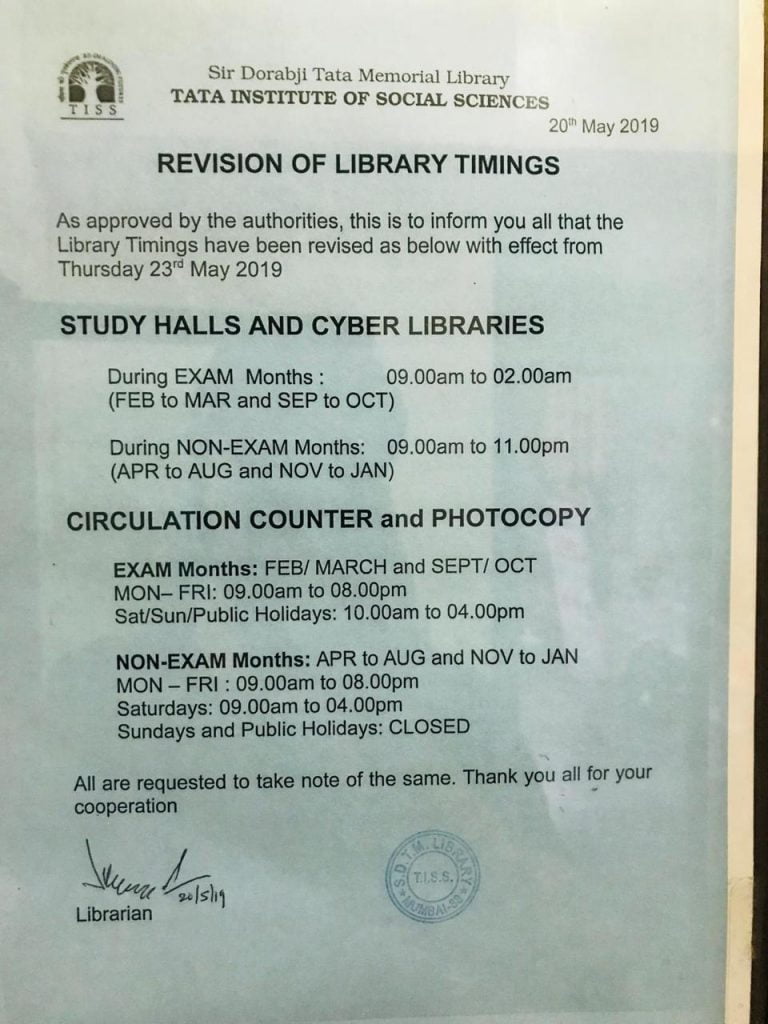A notice released on 20th May 2019 informed the students of Tata Institute of Social Sciences about the revised TISS library timings. The notice, signed by the librarian, said that the same will come into effect within 3 days, i.e. from 23rd May.
This move of the administration drastically cuts down on the library hours available for the students. While earlier the library was open from 9 am to 6 am, now, as per the notice, the library will be open only from 9 am to 2 am during “exam months” (February, March and September, October) and from 9 am to 11 pm during “non-exam months” (April to August and November to January). This means a considerable reduction of 4 hours per day during “exam months” and 7 hours per day during the “non-exam months”.
The administration said that the revision was aimed at using resources “judiciously”. Professor Asha Banu, Dean of Students’ Affairs at TISS said “we conducted a study of the library usage and the logs of students over six months. We are also looking at how other universities are using their libraries. We found that during the exam months, fewer students use the library. They sleep or use it to keep their belongings. We have to look at the utility. A 24/7 library is not viable any longer.”
On 23rd May, the students of the institute held a meeting regarding this decision of the administration. All those who attended the meeting unanimously expressed their dissent. And those who are currently not present on campus because of holidays have been showcasing their disagreement with the decision by sending emails to the administration.
Restriction on timings of the library is a direct restriction on the process of self-learning.
Despite the fact that this decision impacts the entire student community of TISS, it was taken without having any conversation with them. No official statement regarding the objective of this decision or of the basis of arriving at the decision was provided by the institution.
Students drafted a letter addressed to the administration after the meeting. It stated the many reasons for the students’ dissent with this revision of library timings. I have tried to highlight these reasons below.
Why Are Students Against This Decision?
Classes in TISS begin from 9 am and go on till 6 pm every day from Monday to Friday. And the institute has maintained a rule of compulsory 85% attendance. Because of all this, students get free from classes at 6:30 pm every day. And the dining table timings go on from 8 pm to 9:30 pm. This means that the students get free only by 9:30 pm. And that gives them just one and a half hours of library time every day!
TISS library has a centre for visually challenged. It offers assistance to students with disabilities. Restricting the library timings will have an impact on the access to these resources. “Since the order was not sent to us on emails we cannot consider this as a valid order passed to us through official channels of communication. Pasting a circular on library door is in direct disregard to students with visual disability and student community not available on campus due to vacations and data collection for thesis and dissertation work”, was one of the points in the letter written by students.
Cyberlibrary is the place from where a lot of people access digital material. Every day teachers give readings to the students for the next class. And these readings are mostly accessed online. Sometimes teachers mail these readings late at night on the day before the class. If the cyber library section of TISS closes by 11 pm itself, then it becomes practically impossible for students to access knowledge. This especially impacts those who do not possess their own laptops or do not have internet access and rely on the cyber library for the same. On one hand, TISS is continuously shifting its reading curriculum on online platforms but on the other, it is directly denying students the accessibility to it.
In addition to this, a lot of students at TISS have field work on two days a week. This requires them to travel and work for long hours and then to produce a report of the same by the end of the day. Not keeping the library open beyond 11 pm will have a direct impact on the health of students who are already struggling with high academic pressure.
The students also questioned the division of “exam days” and “non-exam days”. TISS has various schools and each of these schools follows different patterns of assessment. The test dates and submission dates are different for different courses. February, March, September and October are not the only months of examinations. Throughout the year there are class texts, research paper submissions, assignment submissions, or some other assessment.
Also read: TISS Mumbai Hosts Its First Bahujan Arts Festival
The readings given at TISS are usually of high theoretical material. They require a lot of time to be understood. Reducing the time of the library brings a disadvantage to those who have a slow reading or learning process. This decision does not keep into consideration the fact that different students study at different rates and some might need preparation beyond the months which are considered the “exam months” by the institution.
Closing the library at 11 pm will force the students to study in their hostel rooms. Hostel rooms have themselves become overcrowded in the past years. With accommodation ranging from 2 to 20 people in a room, studying will be difficult. Students requiring to study would keep the lights switched on during the night disturbing other students who wish to sleep.
The decision of the administration simply discourages the students from spending less time with themselves or with others.
This change in the timings will also have an impact on the availability of other facilities like the printer, photocopy machine, and the circulation counter.
What Do The Students Want?
No other rooms are open for students to study overnight on the campus. Previously students have demanded extra reading spaces within the campus that assists reading overnight. However, this demand has not been heard by the administration.
Restriction on timings of the library is a direct restriction on the process of self-learning. Libraries are spaces where individuals learn by themselves about topics within and beyond the curriculum. Keeping the library open only for 14 hours a day would severely restrict the process of self-learning.
“The move to keep the library closed in night is nothing but one more step to curb the way students live inside the campus, to make them measure everything, to make them more careful of their timing, to make them more cautious, to be under more control and for a significant section to get marginalised even further”, was a statement released by one of the PhD scholars at TISS.
The decision of the administration simply discourages the students from spending less time with themselves or with others. It is an effort to dissolve the limited nightlife present on the campus.
Also read: TISS Women’s Studies Centre Faces Threat Of Closure: Another Space of Dissent Silenced?
“TISS is one of the most progressive institutes which encourage self-learning, curtailing library timings would be a direct discouragement for students in their learning process. Our Institute has surely seen numerous scholars become at this very library and we seek to continue to have this opportunity and request access to our library for the same timings as before (9 am to 6 am)”, said the students.
Response of the Administration
On 22nd May, students in campus held two meetings with the TISS librarian, one in the morning and one in the evening. They expressed their dissent with the change in library timings and demanded that the earlier timings be restored. After a lot of resistance, the TISS administration released the following notice in the evening:
This can be seen as a minor victory for the students in claiming what is rightfully theirs. But it is also important to ensure that this victory is not short lived.
In the end, the issue is not just about the library timings, it is about the larger educational space itself. In times when educational institutions in India are being attacked, it becomes important to ensure that the access to knowledge is not restricted for all or for some.
About the author(s)
Kavya is currently pursuing her MA in Media and Cultural Studies from TISS, Mumbai.






